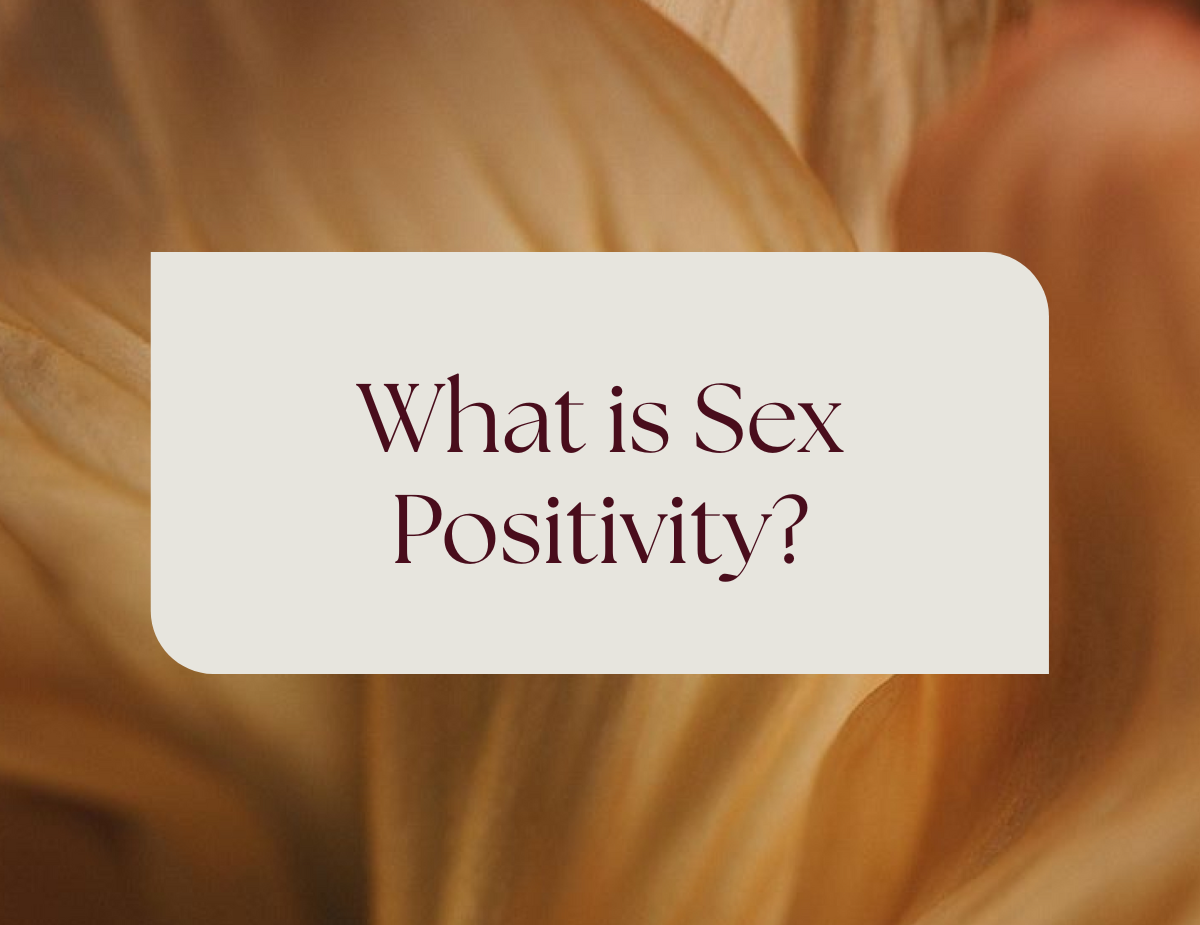You may have heard the term "sex positivity" floating around, but what does it mean? Is it just about being open to more sex, or is there something deeper going on?
Have you ever felt shame around your sexual pleasure or felt uncertain about your own sexual identity or sexual attraction? Have you ever worried about being judged, or judged someone else, about their sexual practices or preferences?
This is all very common and very normal. Why? Because in many countries, including in the Western world, sex is still hushed away, demonised, and clouded with toxic sex-negative narratives.
Sex positivity is the antidote.
So, what is sex positivity?
Sex positivity is the act of embracing sex, sexual activity, and pleasure, physically, mentally, and emotionally, as a natural, healthy part of being a human being.
It's about ditching shame, questioning the rules we’ve inherited, and making space for honest conversations about our sexual desires, identities, and needs. A positive attitude toward sex empowers people to explore consensual sexual practices without judgment.
And why should you care?
Because sex positivity isn't just about sex. It's about freedom. It's about autonomy. And it's about creating a world where people get to feel safe, heard, and whole in their bodies.
Sex positivity means recognising that sexuality can be a source of joy and connection. Being sex-positive doesn’t mean being hypersexual (unless you’re into that). It means approaching sex, desire, and intimacy with openness, curiosity, and respect for others’ boundaries.
And wouldn’t that make the world a much better place?
History and the sex-positive movement
The term emerged from the second-wave feminist movement and from conversations within sex-positive feminism and education circles in the late 20th century. It was a response to sex negativity, a culture steeped in shame, fear, and repression.
The movement gained popularity during the 1960s and 70s, coinciding with the sexual revolution and a push for sexual liberation. Feminist thinkers, women’s rights advocates LGBTQ+ activists, and sex educators including voices like Meg-John Barker and Justin Hancock, championed the importance of consent, diversity, and autonomy.
They helped shape the movement, demanding better sexual health resources, inclusive sex education, and a culture that respected people’s right to explore their sexuality without judgment.
It also worked to remove stigma from those whose desires, bodies, or relationship styles didn’t fit neatly into the mainstream. That work continues today because, despite the gains, stigma still lingers.
Why it matters now more than ever
Even today, conversations around sexual behaviour and identity are often loaded with shame or misinformation. Many young adults grow up without proper education, while parents may still rely on outdated, fear-based messaging.
Sex positivity matters because it challenges that. It makes space for honest, diverse, and open conversations. In a world still grappling with issues like consent, reproductive rights, and gender-based violence, embracing a sex-positive lens has become essential.
So what does that lens look like?
The 3 core principles of sex positivity
1. Consent, communication, mutual respect
Sex positivity starts here. No healthy sexual dynamic exists without these three things. Consent isn’t just a checkbox; it’s ongoing, informed, and enthusiastic. Communication means talking openly about boundaries, desires, and expectations. Respect means valuing those conversations.
When these principles are front and centre, sex becomes something shared, not performed. It becomes safer, kinder, and more connected.
2. Celebration of diversity in desire, orientation, and expression
There’s no one-size-fits-all when it comes to desire. Sex positivity embraces a wide spectrum, kinks, asexuality, queerness, polyamory, monogamy, casual sex, open relationships, and everything in between.
Sexuality isn’t fixed. For many people, it shifts and evolves over time. That’s normal. Sex positivity allows for that fluidity, without judgment or pressure to conform.
3. Body autonomy and pleasure without shame
Sex positivity affirms that your body is yours. You get to choose what you do with it, who you share it with, and what brings you pleasure. It also means challenging the internalised shame many of us carry from how we look to what we enjoy.
It asks us to unlearn toxic messaging that says only certain bodies deserve pleasure or love. It invites us to embrace ourselves as we are, not as we think we should be.
Why should you care?
Sex positivity is deeply linked to personal agency. When we unlearn shame and embrace curiosity, we become more confident in what we want and what we don’t.
That freedom ripples out into every part of life. It encourages honesty, builds self-esteem, and strengthens our ability to advocate for ourselves.
Better education, less shame, healthier relationships
Sex-positive spaces prioritise good information. That means better sex ed, better understanding of our own bodies, and better tools for navigating relationships. It reduces confusion and builds connection.
When we’re informed and unashamed, we make better choices. We’re less likely to accept harmful dynamics or stay silent about our needs.
Challenging stigma and embracing open conversations
Talking openly about sex doesn’t make you dirty; it makes you empowered. Sex positivity invites you to be honest, informed, and compassionate, instead of silent, ashamed, or scared.
Open conversations break cycles of silence. They give others permission to share, to heal, and to grow. That’s how change happens, one honest moment at a time.
Challenges and misconceptions
What people get wrong about sex positivity
Some people think being sex-positive means saying yes to everything. Not true. It’s about freedom to choose, not pressure to perform. Others assume it’s only for people with lots of sexual experience. Also false. It’s for anyone open to learning and reflecting.
It’s also not about pushing people into things they’re not ready for. In fact, it encourages slow, thoughtful, intentional choices.
Separating objectification from empowerment
Sex positivity means respecting how people choose to express themselves, including sexually. That doesn’t mean reducing them to objects. It’s about agency. A sex-positive world uplifts choice, not exploitation.
Empowerment is about who holds the power. If someone is expressing themselves for their own joy, that’s empowerment. If they’re doing it under pressure, that’s something else entirely.
Navigating societal or cultural pushback
Depending on your background, embracing sex positivity might feel rebellious or even risky. That’s okay. It’s a process. You get to move at your own pace. Finding supportive spaces, voices, and educators helps.
Cultural change takes time. So does personal unlearning. But every small step forward matters.
How to live “Sex Positively”
What it looks like in practice
It means asking questions. Listening to your body. Respecting your partners. Owning your desires. And learning that it’s okay to change your mind.
It also means letting go of comparison. Your sex life doesn’t need to look like anyone else’s. It just needs to feel good, safe, and right for you.
Creating non-judgmental spaces in relationships and communities
Whether it’s with a partner, a friend, or a group, sex-positive spaces make room for real talk. No shame. No assumptions. Just connection and curiosity.
This can look like using inclusive language, normalising consent conversations, or simply making room for diverse stories and experiences.
Encouraging conversation and critical thinking
We all carry beliefs from culture, family, or media. Being sex-positive means noticing them and questioning them. Ask: who benefits from this belief? Do I agree with it? Do I want to keep it?
Reflection is key. So is being willing to get it wrong, learn, and do better.
The bigger picture
Media’s influence and responsibility
TV, film, and social media shape how we think about sex. Sex positivity calls for better representation, stories that show consent, diversity, and real intimacy.
We need narratives that reflect reality, not just fantasy. That means showing queer joy, body diversity, and authentic emotional connection.
Sex positivity in schools and education
Young people deserve better than scare tactics and silence. Inclusive, age-appropriate, shame-free sex education is key to building safer, healthier futures.
Good sex ed includes pleasure, boundaries, consent, and identity. It empowers young people to make informed, respectful choices.
The role of social media and creators
From sex educators to body-positive influencers, online spaces can be powerful platforms for learning and unlearning. But they also need to be safe and accurate. Be curious and critical.
Follow educators who centre consent, intersectionality, and inclusion. Avoid anyone selling shame or quick fixes.
Embracing sex positivity, well…positively!
Why embracing sex positivity benefits everyone
Sex positivity isn’t just about personal pleasure, it’s about collective wellbeing. It helps us build trust, confidence, and equity in our relationships and our culture.
It gives us tools to understand ourselves and connect with others without fear or judgement. That’s good for individuals, families, and communities.
You don’t need all the answers. You just need to stay open. Stay kind. Stay curious. And remember, sex positivity starts with you.
Wherever you are on your journey, there’s space for you here.
Additional Resources
Books, blogs, and educators
- "Come As You Are" by Emily Nagoski
- "Sex Positive Families" (Instagram)
- "Sex Is a Funny Word" by Cory Silverberg (great for all ages)
Communities and organisations to explore
- Kink Compass educational hub (that’s us!)
- The Sex Education Forum (UK)
- Scarleteen
- BISH UK (a sex-positive resource for young people)
Want more tools for exploring sex positivity, pleasure, and consent? Join our community and get fresh guides, blogs, and events straight to your inbox.



.svg)


